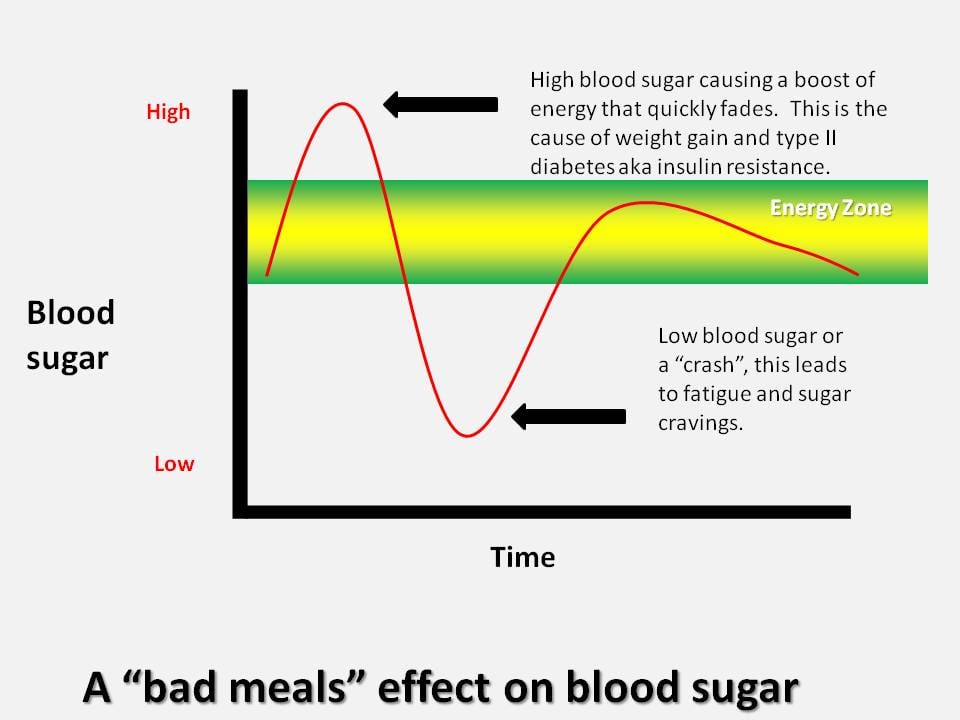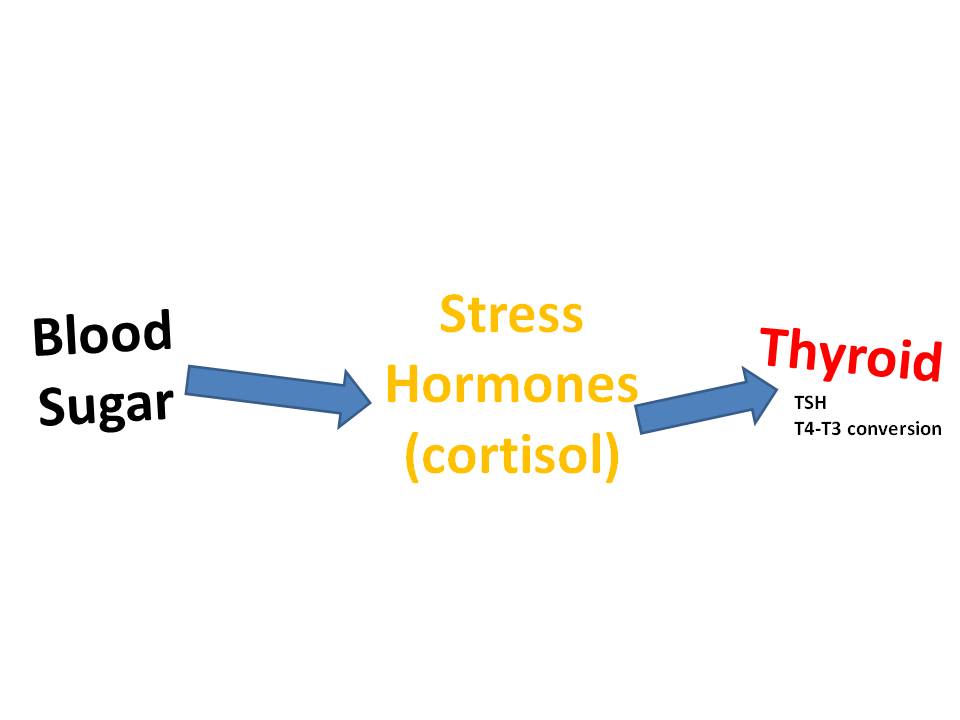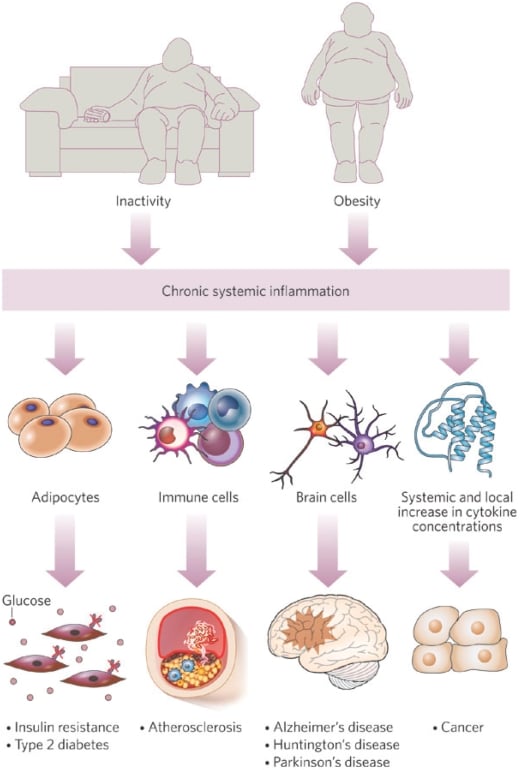Insulin, Blood Sugar and Thyroid – Hidden Cause of Thyroid Problems #1:
How do insulin and blood sugar levels affect your thyroid? Well let’s quickly review insulin and blood sugar regulation. The reader’s digest version goes like this; eat carbs, then your blood sugar rises which then causes a release of insulin. A reasonable amount of carbs and stimulation of this process is OK and actually good, however most people are consuming far too much carbohydrate which then causes a myriad of problems. You could fill an entire book on this topic alone, but for now lets focus on the thyroid connection.
Insulin and blood sugar primarily influence your thyroid through;
- Stress hormones
- Inflammation
- Digestive problems; dysbiosis/infections
- Provoking autoimmunity
Lets work through each one of these.
Sugar & Stress Hormones
Stress hormones, specifically cortisol, are intimately linked to your blood sugar levels and imbalances in stress hormones levels will cause problems with your thyroid. Said another way, blood sugar levels have a profound impact on stress hormones and stress hormones effect your thyroid (see picture). When cortisol levels become too high you will experience a decrease in TSH. When cortisol levels become too low you will have impaired conversion of T4 to T3. 1-8

- Tired
- Not sleeping well – waking up more in the middle of the night and can’t get back to sleep
- Stubborn belly fat
- Energy dips through the day
- Less desire for exercise
- Lowered libido
- Impaired thinking
- In ability to cope with stress like you used to
- There are just a few, but does this remind you of anyone?
So in recap; eating too many carbs causes blood sugar levels to go too high, then the body can over react causing blood sugar levels to go too low, then cortisol must be released to balance things out. This can cause stress hormone imbalances (and a condition known as ‘adrenal fatigue’) and remember if your stress hormones go out of balance so do your thyroid hormone levels. The most important things we can do to balance stress hormones are diet, sleep, clearing any infections, exercise and managing life stress.
Sugar & Inflammation
OK, lets heat things up and talk about the blood sugar-inflammation connection. High blood sugar is indirectly and directly inflammatory. Inflammation causes thyroid problems in pretty much every way possible (please see the chapter on inflammation to see the jaw dropping connection between inflammation and thyroid disease). But how exactly does high blood sugar cause inflammation? I’m glad you asked because there is a lot to tell.
Blood sugar spikes are directly inflammatory and damaging through formation of what’s know as advanced glycation end products also know as AGEs because they cause accelerated aging amongst other things. Glycation is a process in which blood sugar elevations cause damage to protein and fat tissues of your body, think of it like internal rusting. Specifically glycation is the result of a sugar molecule bonding to a protein or lipid molecule without the controlling action of an enzyme, which then interferes with cellular function and causes cellular damage. Glycation is one of the reasons people with advanced stage diabetes experience damage to their eyes, kidneys and extremities. So if its not clear yet, glycation can not only throw off your thyroid function but cause a host of other problems at the same time. As I keep saying, if we treat the ‘cause’ one may experience many ‘side benefits’ like anti-aging for example.
Blood sugar spikes, like you experience after that breakfast, are known to cause an increase in inflammatory compounds known as cytokines. High blood sugar and insulin resistance has been correlated with elevations of several different inflammatory cytokines, they have funky names like IL-1β, IL-6 and TNFɑ (interlukin 1beta, interlukin 6 and Tumor Necrosis Factor alpha). 9
Some researchers are now suspecting a cellular receptor called NF-kβ, could be the reason we see diabetes, obesity, chronic inflammation and high blood pressure all tend to occur together. 10, 11
NF-kβ is short for Nuclear Factor Kappa Beta. No this is not a frat, although NF-KB to a cell is as a frat party is to a house, it really messes things up. NF-KB actually acts on a cellular level and effects how your cellular DNA expresses itself. What wrong with the Kappa Beta’s? Well NF-KB increases how strongly your cells respond to inflammation. Too much NF-KB makes John and inflamed boy.
In fact some studies have shown that herbal treatments that lower NF-KB may be a successful treatment for diabetes, heart disease and obesity. While we still have more to learn about this, it is very interesting. 12, 13, 14, 15
J Clin Invest. 2006 July 3; 116(7): 1793–1801 PMID: 16823477
Blood sugar elevations are also one of the strongest factors causing weight gain. And guess what; generally speaking the more fat you have the more inflamed you are. Just have a look at these diagrams. They illustrate how fat causes increased cytokines which then cause inflammation, insulin resistance and clogging of your arteries.
Trans Am Clin Climatol Assoc. 2010;121:1-20. PMID: 20697546
Sugar & Fungus
After cutting excess carbs out of the diet for a while many patients feel better. When they try to go back to the higher carb diet they used to eat many of my patients comment, “I do not do well with carbs.” Often times, the reason for this is because too much sugary and/or starchy carbs throws off the delicate balance of bacteria and fungus in the gut.
Sorry to burst your bubble but eating too much carbohydrate feeds the growth of intestinal fungus, yuck. Now, even though this sounds gross we should have some fungus in our intestines as they serve a symbiotic or beneficial role for the body. 16 Symbiosis is essentially a win-win situation between your body and certain microbes. So how does this so called healthy fungus become a problem? Well, when there is too much of it, it becomes a problem. Sugar and starch consumptions feed fungal overgrowth. Add this to the other factors that allow fungus to throw a proliferation party (prior use of antibiotics, contraceptive use, stress, lack of sleep, no or short-term breast feeding, lack of probiotic foods in diet, cesarean birth and the overly sterile US environment) and you can quickly see why this is becoming quite a prevalent problem.
But how does fungus effect my thyroid? Intestinal fungal overgrowth can cause inflammation (and remember we already discussed the tremendously negative effect inflammation has on your thyroid). 17, 18, 19, 20 Additionally fungus can release large amounts of a compound known as acetaldehyde and this compound can block the function of thyroid hormone. This process is again fueled by high carb intakes. 21, 22, 23 This acetaldehyde has also been suggested to cause brain fog. 24
Sugar Provokes Autoimmunity
Finally, some evidence is showing the spikes in blood sugar, again like after that ‘healthy’ breakfast, can provoke autoimmunity. Remember that autoimmunity is the primary cause of hypothyroid in the U.S. While we still need more research on this connection, it is my feeling that further research should only strengthen this association. In fact one study has shown a direct relationship between leptin and thyroid autoimmunity. 25 And other studies have shown higher levels of leptin may provoke other forms of autoimmunity. 26
What is leptin? Leptin is a hormone release by fat cells that signal satiety (feeling full). Here is how this works. You eat, you then store some calories in your fat cells, fat cells then release leptin. Leptin then tells your brain you are satisfied and then your hunger goes away. Now when we become higher in body fat, we start to release too much leptin and then become leptin resistant. When we become leptin resistant we start over eating because our “hey you are full stop eating signal” from the brain stops working. Then you just can’t have just one, of anything. So in recap, when you start to gain fat (remember high sugar/starch diet & high blood sugar/insulin levels are one of the fastest ways to achieve this), you then secrete too much leptin and become resistant to it. This stinks because leptin tells you that you are full, so if you are resistant to your ‘stop eating signal’… well you don’t stop eating. And remember some evidence is showing that the higher leptin goes, the worse your autoimmunity becomes.
Here is what this may look like. You start noticing you are adding some extra chips, or cereal, or chocolate, or jamba juice, or pasta, etc… to your diet. You’re not sure why, but your just kind of craving it. At first it’s just a little, but then over time you notice this has turned into a habit and it’s starting to get worse every month. You are also starting to get tired, colder and might have a harder time sleeping at night. You might also be depressed, bloated or see your libido starting to tank. What’s happening is blood sugar imbalances are causing inflammation, leptin resistance, feeding fungus & therefore causing bloating, driving autoimmunity, damaging your thyroid and throwing off your stress hormones. Now, when your endocrinologist says that diet doesn’t have much to do with your thyroid, I hope you can clearly see you need a second opinion.
Very low carbohydrate dieting may also be a problem. Keeping your total daily carb intake below 50 grams for months on end may be problematic for some. For most this will not be an issue, but if your getting lots of exercise, are fairly lean and otherwise healthy, this could be causing thyroid imbalance. An easy way to figure this out is to increase your daily carb intake by 50grams or so per day and see if you feel better.
I hope this helps you see that despite the fact that many in healthcare don’t pay much lip service to diet, it’s a big deal. Your diet is the strongest influencer of your blood sugar and insulin levels and these have a substantial impact on your overall health and thyroid. In addition to diet the most important things we can do to balance blood sugar are; address stress hormones, sleep, clearing any infections (like fugus), exercise and managing life stress. In the next section we will discuss another very important part of diet, food allergies.
- J Clin Endocrinol Metab. 1976 Aug;43(2):338-46. PMID: 820709 http://www.ncbi.nlm.nih.gov/pubmed/820709
- Horm Metab Res. 1986 Jan;18(1):76-7. PMID: 3512397 http://www.ncbi.nlm.nih.gov/pubmed/3512397
- http://www.ncbi.nlm.nih.gov/pubmed/?term=19280433
- http://www.ncbi.nlm.nih.gov/pubmed/?term=1328349
- http://www.ncbi.nlm.nih.gov/pubmed/?term=233400
- http://www.ncbi.nlm.nih.gov/pubmed/?term=8299707
- http://www.ncbi.nlm.nih.gov/pubmed/?term=4002999
- http://www.ncbi.nlm.nih.gov/pubmed/?term=6305081
- Biochem J. 2010 Aug 15;430(1):141-149. PMID: 20522023 http://www.ncbi.nlm.nih.gov/pubmed/?term=20522023
- Fiziol Zh. 2012;58(1):93-101. PMID: 22590744 http://www.ncbi.nlm.nih.gov/pubmed/?term=22590744
- Biochem J. 2010 Aug 15;430(1):141-149. PMID: 20522023 http://www.ncbi.nlm.nih.gov/pubmed/?term=20522023
- J Cell Physiol. 2010 Aug;224(2):423-432. PMID: 20333650 http://www.ncbi.nlm.nih.gov/pubmed/?term=20333650
- Endocrinology. 2008 Jul;149(7):3549-3558. PMID: 18403477 http://www.ncbi.nlm.nih.gov/pubmed/?term=18403477
- Eur J Nutr. 2011 Apr;50(3):151-161. PMID: 21442412 http://www.ncbi.nlm.nih.gov/pubmed/?term=21442412
- Eur J Pharmacol. 2010 Jun 10;635(1-3):1-8. PMID: 20303945 http://www.ncbi.nlm.nih.gov/pubmed/?term=20303945
- http://www.ncbi.nlm.nih.gov/pubmed/22778094
- http://www.ncbi.nlm.nih.gov/pubmed/23922372
- http://www.ncbi.nlm.nih.gov/pubmed/19917501
- http://www.ncbi.nlm.nih.gov/pubmed/23896471
- http://www.ncbi.nlm.nih.gov/pubmed/23475217
- http://www.orthomolecular.org/library/jom/1984/pdf/1984-v13n02-p066.pdf
- http://www.ncbi.nlm.nih.gov/pubmed/?term=8814648
- http://www.ncbi.nlm.nih.gov/pubmed/3733169
- http://www.ncbi.nlm.nih.gov/pubmed/?term=8814648
- J Clin Endocrinol Metab. 2010 Aug;95(8):3965-72. doi: 10.1210/jc.2009-2798. Epub 2010 Jun PMID: 20534769 http://www.ncbi.nlm.nih.gov/pubmed/?term=20534769
- J Immunol. 2013 Feb 27. PMID: 23447682 http://www.ncbi.nlm.nih.gov/pubmed/?term=23447682


Discussion
I care about answering your questions and sharing my knowledge with you. Leave a comment or connect with me on social media asking any health question you may have and I just might incorporate it into our next listener questions podcast episode just for you!